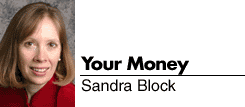The housing bubble, as it impacted much of the country, was referred to as a momentary lapse in judgment by nearly everyone involved. But it's also a fact that we didn't learn from previous bubbles. We jumped from a real estate bubble in the early 90's to a dot.com bubble to a stock bubble back to another housing bubble. Much of that fault was attributed to insiders who should have known better. But the reward system was skewed to encourage the bad behavior on the part of lenders, Wall Street exacerbated the situation by promising investors impossible and unsustainable returns and the public jumped on board fearing that if they didn't they would forever be in the outside looking in.
 Obviously
there were perception errors at
every level of the
equation but again, the blame has to lie with the
professionals who
should have known better rather than with the people at the bottom who
were just trying to grab a piece of the pie they saw being handed out
all around them. In that sense, we've moved from a vicious circle to a
virtuous cycle. Now we're victimized by the snap-back or
knee-jerk and
saddled with significantly, and to some extent, unnecessarily tightened
lending regulations.
Obviously
there were perception errors at
every level of the
equation but again, the blame has to lie with the
professionals who
should have known better rather than with the people at the bottom who
were just trying to grab a piece of the pie they saw being handed out
all around them. In that sense, we've moved from a vicious circle to a
virtuous cycle. Now we're victimized by the snap-back or
knee-jerk and
saddled with significantly, and to some extent, unnecessarily tightened
lending regulations.
 There
was some concern voiced that we may be digging ourselves into an even
deeper hole by funding the various stimulus programs - but it was also
acknowledged that it may need to happen, However, it needs to happen
without bankrupting our future and laying the groundwork for rampant
inflationary pressure. We can afford - indeed according to many, we need
to afford - to make these investments right now but by
next year or the following year at most, we
need to start pulling back. As a country we
cannot continue to expand
the deficit without suffering dire consequences - so short
term we're
OK, long term will depend on how well we contain the expenditures by
the government and how much of that money can safely be withdrawn from
the market sooner rather than later. The government can't
continue to
deficit spend on stimulus because the service on that overwhelming debt
will force higher ratios that will choke off the very stimulus they are
trying to encourage.
There
was some concern voiced that we may be digging ourselves into an even
deeper hole by funding the various stimulus programs - but it was also
acknowledged that it may need to happen, However, it needs to happen
without bankrupting our future and laying the groundwork for rampant
inflationary pressure. We can afford - indeed according to many, we need
to afford - to make these investments right now but by
next year or the following year at most, we
need to start pulling back. As a country we
cannot continue to expand
the deficit without suffering dire consequences - so short
term we're
OK, long term will depend on how well we contain the expenditures by
the government and how much of that money can safely be withdrawn from
the market sooner rather than later. The government can't
continue to
deficit spend on stimulus because the service on that overwhelming debt
will force higher ratios that will choke off the very stimulus they are
trying to encourage.
 One
final statement to close out the morning session was voiced by a member
of the lending industry. He bemoaned the fact that virtually all the
morning panel session was devoted to a discussion of what he referred
to as the bottom 20%
of the market. He encouraged us to devote
an equal amount of time and effort on the other 80%. While
there was
some disagreement as to whether 20% or 30% or as much as 50% of current
homeowners are underwater, 80%+ are still performing, are not
delinquent, barring something catastrophic will not become delinquent
and in fact are still buying homes, cars etc. Unfortunately these are
often the very people being demonized by the
administration in spite of
their track record and contributions because many of them make over
$200,000 a year and own expensive homes they aren't losing. These are
the people that can help pull us out of this situation as long as we
don't disincent them.
One
final statement to close out the morning session was voiced by a member
of the lending industry. He bemoaned the fact that virtually all the
morning panel session was devoted to a discussion of what he referred
to as the bottom 20%
of the market. He encouraged us to devote
an equal amount of time and effort on the other 80%. While
there was
some disagreement as to whether 20% or 30% or as much as 50% of current
homeowners are underwater, 80%+ are still performing, are not
delinquent, barring something catastrophic will not become delinquent
and in fact are still buying homes, cars etc. Unfortunately these are
often the very people being demonized by the
administration in spite of
their track record and contributions because many of them make over
$200,000 a year and own expensive homes they aren't losing. These are
the people that can help pull us out of this situation as long as we
don't disincent them.
It was also pointed out that this top 1% of our citizens bear nearly 40% of our tax burden with the top 5% picking up over 60% of the tab. This is the demographic that will fund the recovery to a large extent but only if they are not increasingly burdened in a misguided populist attitude to 'level the playing field'. If that group stops investing in stock, buying homes and cars and driving job creation, the effects will be devastating. To some extent it is this entrepreneur class that is fueling some of the declining statistics we're seeing the commercial market right now. The commercial market generally lags the residential;l market by 1 to 1 1/2 years but the commercial market can be stabilized right now if housing recovers. If housing is not allowed to recover, if lenders who are posting substantial profits continue to hoard their cash instead of lending it out, then the commercial market will edge into a deepening spiral and the resultant job loss will further depress housing. That goes back to that vicious circle / virtuous cycle comment in the previous post.


Comments(0)